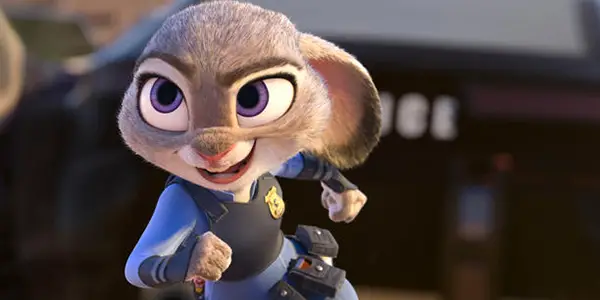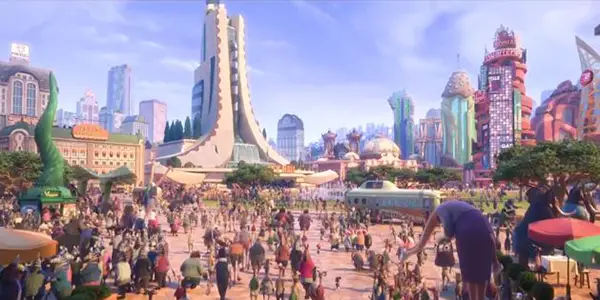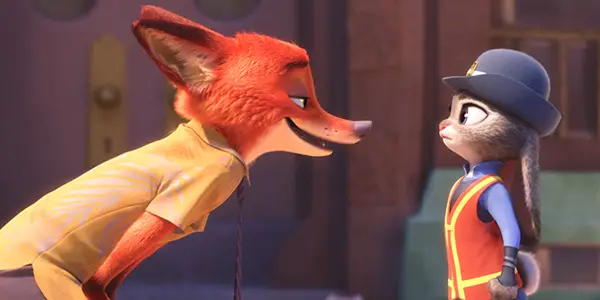ZOOTOPIA: A Witty, Intelligent, Politically Conscious Kids Film

David is a film aficionado from Colchester, Connecticut. He enjoys…
Zootopia is the cinematic equivalent of a Dr. Seuss novel; though mostly made for kids, it resonates with deeper and socially relevant themes. The political landscape from which this film was born is apparent almost from the start, and though at times less than subtle with its agenda, it still manages to be an incredibly witty, emotional and entertaining movie experience.
Disney at its most progressive
Zootopia takes place in a world where animals have evolved past their baser instincts into humanoid creatures, who walk, talk, wear clothes, and hold desk-jobs. The story focuses on Judy Hopps (Ginnifer Goodwin), a rabbit who aspires to be a police officer. Though met with criticism and faced with obstacles due to being a smaller animal than your typical cop, Judy is determined, and eventually lands a job in the animal city of Zootopia.
Far from being an instant success at her job, though, Judy is met with scorn and disdain, and is looked down upon (literally) by the remainder of the Zootopia Police Department. Her boss Chief Bogo (Idris Elba) assigns her parking duty, and it is only by solving a seemingly impossible case that she will be able to do more serious police work.

The last big hit from Disney Studios was the princess film Frozen, which also managed to be one of the highest-earning animation films of all time (it also spawned the song Let it Go, which I still can’t get out of my head). Though I enjoyed that film mostly due to its similarities to classic Disney, it almost seems like it was produced by a different studio than the one that created Zootopia. In the last few years, the events in Ferguson, Baltimore, and more made front-page headlines, and it is almost surely these events that inspired the writing of this film. For that reason, it is easily amongst their most historically significant movies.
The world of Zootopia is far from the utopia that it at first appears to be. Animals are discriminated against based upon stereotypes, predators and prey often interact solely with their own kind, and animals are even taught at a young age to fear certain species. Judy’s parents, for instance, give her fox repellent before she leaves for her police work, due to the fox’s ancient reputation of preying upon rabbits.
The self-aware world of Zootopia is obviously meant to satirize our own, with predators seeming to represent minority groups that are typically discriminated against, Judy herself representing women, and many more links. The exact connections sometimes get fuzzy, but this I believe was an intentional move by writer Jared Bush and by directors Byron Howard and Rich Moore. The point to take away here is that, much like our own world, Zootopia is a place where inherent prejudices exist. But it is also a place where we can move past those prejudices, if we only learn to change that part of ourselves.
Building a world
Moving past the social commentary, Zootopia also creates a vibrant and elaborate world. A place where rhinos and elephants dress up and walk around on two legs could have been incredibly silly if done the wrong way, but the designs and animation are such that this world simply becomes a perspective of normality.
When Judy first enters the city, the camera travels across the individualized zones of the city, where different animals live depending on their species. Tigers, for example, live in the jungle zone, while polar bears live in the tundra, and rodents even have their own miniaturized version of a city. It is amongst the more creative world-building that Disney has created in an original film, with perhaps the closest example being the Disney Pixar film Monster’s Inc.

As a world modeled much like our own, Zootopia does not miss out on opportunities to poke fun at some of our shared experiences. Easily the funniest scene of the film takes place at the DMV, which is inconveniently run by sloths. In a long, drawn out sequence, the simple act of getting a license plate number takes hours to achieve. There are also a number of cultural references in the film that kids might miss, such as bootleg animal versions of past Disney films, a reference to the popular show Breaking Bad, and even a tiny shrew that is modeled directly after Vincent Corleone in The Godfather. Such witty references are just what distinguishes Disney from the many other animation studios out there, who create films that are almost solely meant for children.
Voice acting and life lessons
The most significant relationship in Zootopia is, not too surprisingly, between Judy and her supposedly natural enemy, a fox. Named Nicholas P. Wilde (Jason Bateman), he helps Judy with her quest to find a missing otter, which would help her get past her assigned parking duties. Much like many Disney films, the partnership is at first a reluctant one, but is eventually one that comes from respect, and such a concept is played off well by voice actors Ginnifer Goodwin and Jason Bateman.

The connection between the two, though, eventually reveals the most significant theme of the film. Judy at one point gives a talk where she unintentionally speaks out her own inner prejudices, which then sparks a wildfire of discrimination across Zootopia. Though not intending it, and at her core a decent person, Judy soon realizes her mistake.
And it is such a dilemma that lies at the heart of Zootopia: it is not those around us that we should look out for when it comes to prejudices and discrimination, it is actually a part of ourselves that we must change, because even the best of us harbor preconceived notions about others that could determine our words and our actions. It is a surprisingly progressive theme to find in a kids film, but an important one nonetheless, and one that will hopefully register towards the film’s targeted younger audience.
Conclusion
Zootopia is clearly made with a political agenda, and for that reason it has the potential to come off as preachy to some viewers. Luckily, the exuberant animation, superb voice acting, and amazing world-building could potentially allow even those people to enjoy it. For a film that seemingly came out of nowhere, and which I was not expecting much from, Zootopia is truly a surprising delight.
So what did you think of Zootopia? Did you find its themes of prejudice and discrimination to be effective?
Does content like this matter to you?
Become a Member and support film journalism. Unlock access to all of Film Inquiry`s great articles. Join a community of like-minded readers who are passionate about cinema - get access to our private members Network, give back to independent filmmakers, and more.
David is a film aficionado from Colchester, Connecticut. He enjoys writing, reading, analyzing, and of course, watching movies. His favorite genres are westerns, crime dramas, horror, and sci-fis. He also enjoys binge-watching TV shows on Netflix.













